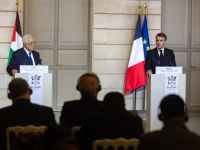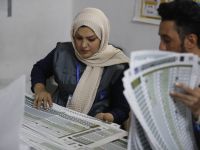A Muslim activist charged with carrying out a deadly bomb attack on a former Turkish minister declined to answer the judge's questions at the first hearing of his trial in Ankara on Friday, the Anatolia news agency reported.
Rustu Aytufan, who risks the death sentence if convicted, said he was "psychologically" unprepared to testify and that nothing he would say would help justice, according to Anatolia.
The judge adjourned the trial to a later date to allow Aytufan to prepare his testimony, Anatolia said.
The prosecution has said Aytufan detonated a home-made bomb in the car of Ahmet Taner Kislali, a prominent pro-secular writer and former culture minister, in October 1999 as part of a campaign "to destroy the state's constitution and its fundamental order."
Two other suspects in the assassination, Necdet Yuksel and Ferhat Ozmen, helped Aytufan at the scene of the murder in a posh Ankara suburb, the indictment said.
The trial of Yuksel and Ozmen, charged in a separate indictment for the Kislali killing and deadly bomb attacks on three other pro-secular intellectuals in the early 1990s, started in August.
Judge Huseyin Eken said Friday that Aytufan's trial was the most important one in Turkey since the conviction of Kurdish rebel leader Abdullah Ocalan in June 1999, according to Anatolia.
The prosecutor, who prepared both indictments, said Aytufan, Yuksel and Ozmen were members of the Turkish wing of the so-called Jerusalem Army, allegedly a branch of Iran's Revolutionary Guards seeking to overthrow the secular regimes in neighboring countries.
The three men are suspected of carrying out a series of other violent attacks as well.
The indictment said Aytufan had received military training in Iran, which Turkish prosecutors have accused in several other cases of aiding Turkish extremists within a campaign "to export the Islamic revolution" to Turkey.
Three other suspects, tried along with Aytufan, risk up to seven years and six months in jail for "aiding the Jerusalem Army."
Ties between Turkey and Iran were strained in May after police launched a massive hunt for suspected Islamic militants and the Turkish press singled out Iran as the mastermind behind the killings of a number of leading pro-secular figures.
Even though Tehran denied the charges, Turkish Prime Minister Bulent Ecevit said that "some separatist groups in Turkey and others exploiting religion have benefited from Iran's hospitality or have used for themselves its tendency to export the revolution." – ANKARA (AFP)
© 2000 Al Bawaba (www.albawaba.com)







